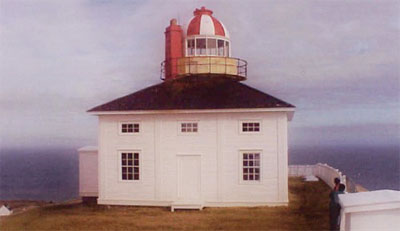Other Name(s)
Cape Spear Lighthouse National Historic Site of Canada
Cape Spear Lighthouse
Phare de cap Spear
Links and documents
Construction Date(s)
1835/01/01
Listed on the Canadian Register:
2007/05/22
 Statement of Significance
Statement of Significance
Description of Historic Place
Set high on a bluff overlooking the approaches to St. John's harbour Cape Spear Lighthouse is a visual icon of the province of Newfoundland. Restored by Parks Canada to its early 19th-century core, the structure is an elegant neoclassical cube with a domed light tower rising from its centre. It shares its site with a functioning light, and is now operated as a historic site open to the public.
Heritage Value
Cape Spear Lighthouse was designated a national historic site of Canada for its age and architecture.
The heritage value of Cape Spear Lighthouse lies in the remaining physical form and materials of the 1830s lighthouse, and the strategic location and isolated nature of its site. Built in 1835 by the Colony of Newfoundland to signal the approach to St. John's harbour, Cape Spear Lighthouse was in continuous operation from 1836 to 1955. The building evolved over the years, but when it was developed by Parks Canada in 1975 as an historic site, it was restored to its 1835-1840 appearance.
Sources: Historic Sites and Monuments Board of Canada, March 1962 Minutes; Commemorative Integrity Statement, June 1999.
Character-Defining Elements
Key elements contributing to the heritage value of this site include:
- its square massing with a low hipped roof surrounding a round dome-topped central tower;
- its relatively squat neoclassical proportions;
- the symmetry of its exterior entry facade, horizontally subdivided into three equal bays marked by pilasters, and vertically subdivided into three layers with the tower itself also vertically subdivided into three equal layers consisting of the walkway and housing, panoramic window, and dome;
- the expression of neoclassical design principles in the large balanced rectangular windows on the ground floor topped by smaller ones (some false) on the upper storey, regular subdivisions in the panoramic tower window and use of a recessed, central dome;
- the use of materials typical of early lighthouses: masonry for the tower, metal for the lantern and wood for the house;
- the quality and craftsmanship of its original materials, in particular its stone tower and foundation, wood framing, (some) wooden cladding, the masonry of its early fireplaces, the cast iron sashes and glass on windows in the light room;
- its original light equipment;
- functional subdivision of the interior space with four rooms on each storey;
- the central staircase linking residential space, and residential space to light space;
- the location of the building on its site;
- the isolated nature of the site;
- viewplanes from the lighthouse to sea-lanes approaching the mouth of St. John`s harbour.
 Recognition
Recognition
Jurisdiction
Federal
Recognition Authority
Government of Canada
Recognition Statute
Historic Sites and Monuments Act
Recognition Type
National Historic Site of Canada
Recognition Date
1962/05/15
 Historical Information
Historical Information
Significant Date(s)
1835/01/01 to 1840/01/01
Theme - Category and Type
- Developing Economies
- Technology and Engineering
- Expressing Intellectual and Cultural Life
- Architecture and Design
- Developing Economies
- Communications and Transportation
Function - Category and Type
Current
- Leisure
- Museum
Historic
- Transport-Water
- Navigational Aid or Lighthouse
Architect / Designer
n/a
Builder
n/a
 Additional Information
Additional Information
Location of Supporting Documentation
National Historic Sites Directorate, Documentation Centre, 5th Floor, Room 89, 25 Eddy Street, Gatineau, Quebec
Cross-Reference to Collection
Fed/Prov/Terr Identifier
219
Status
Published
Related Places

Cape Spear (Old) Lighthouse
The Cape Spear (Old) Lighthouse combines a lighthouse and keepers’ dwelling, a popular 19th century design. Built in 1835, the circular stone tower measures 9 metres (30 feet),…

Cape Spear Lighthouse
The Cape Spear Lighthouse at Cape Spear National Historic Site of Canada is a Neoclassical, two storey, cubic building with clapboard siding, and a low hip-roof crowned with a…